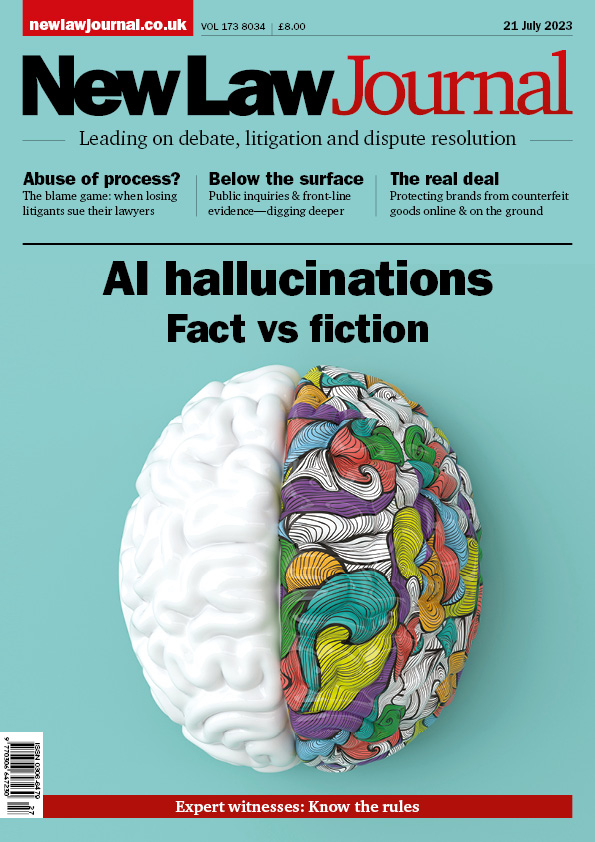THIS ISSUE

Artificial intelligence (AI) tools are known to ‘hallucinate’, making up false information or confabulating to fill gaps in their knowledge. But who is responsible in law for any libel or harm caused as a result? In this week’s NLJ, Chloe Flascher, associate at Withers, addresses this fascinating conundrum.
In this week’s NLJ, Richard Scorer, head of abuse law & public inquiries at Slater and Gordon, highlights the necessity of ‘proper forensic scrutiny’ during public inquiries.
A recent employment appeal concerning a teacher dismissed for expressing gender-critical views on Facebook is a significant development in employment law because the Employment Appeal Tribunal (EAT) focused on the ‘reason why’ question. In this week’s NLJ, Charles Pigott, professional support lawyer, Mills & Reeve, explains why the EAT’s approach ‘marks a significant development’ for discrimination claims, breaking new ground.
'Litigants who lose sometimes blame their lawyer' is a truth widely acknowledged in the legal sector. Writing in this week’s NLJ, Michael Bundock, barrister, dispute resolution, LexisNexis, looks specifically at the circumstances in which a negligence claim may be struck out as an abuse of process because it involves a collateral attack on the earlier judgment.
Public inquiries are most effective when their scrutiny goes below the surface, writes Richard Scorer
A recent Employment Appeal Tribunal ruling on gender-critical beliefs has brought human rights to the fore: Charles Pigott analyses a significant development for discrimination claims
What next when a disgruntled litigant decides to sue their lawyer for negligence after losing a case? Michael Bundock examines when such a claim may be struck out as an abuse
Neil Parpworth outlines the latest thinking—& some potential inaccuracies—from the Home Office on stop & search powers
Billions are spent on counterfeit goods in the EU & UK each year: Matti Lindberg & My Mattsson set out some top tips for brand owners to protect their rights online & on the ground
Artificial intelligence tools are not (yet) above creating false information: who could be liable for the serious harm suffered as a result of publishing that information? Chloe Flascher examines a thorny legal issue
MOVERS & SHAKERS

Jurit LLP—Caroline Williams
Private wealth and tax team welcomes cross-border specialist as consultant
.tmb-mov69x69.jpg?sfvrsn=961ae4db_1)
HFW—Simon Petch
Global shipping practice expands with experienced ship finance partner hire
95ca96e3d47f4eff8d147c4f0df17c77.tmb-mov69x69.png?sfvrsn=3db5d86b_1)
Freeths—Richard Lockhart
Infrastructure specialist joins as partner in Glasgow office
NEWS
Talk of a reserved ‘Welsh seat’ on the Supreme Court is misplaced. In NLJ this week, Professor Graham Zellick KC explains that the Constitutional Reform Act treats ‘England and Wales’ as one jurisdiction, with no statutory Welsh slot
The government’s plan to curb jury trials has sparked ‘jury furore’. Writing in NLJ this week, David Locke, partner at Hill Dickinson, says the rationale is ‘grossly inadequate’
A year after the $1.5bn Bybit heist, crypto fraud is booming—but so is recovery. Writing in NLJ this week, Neil Holloway, founder and CEO of M2 Recovery, warns that scams hit at least $14bn in 2025, fuelled by ‘pig butchering’ cons and AI deepfakes
After Woodcock confirmed no general duty to warn, debate turns to the criminal law. Writing in NLJ this week, Charles Davey of The Barrister Group urges revival of misprision or a modern equivalent
Family courts are tightening control of expert evidence. Writing in NLJ this week, Dr Chris Pamplin says there is ‘no automatic right’ to call experts; attendance must be ‘necessary in the interests of justice’ under FPR Pt 25






